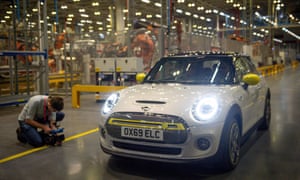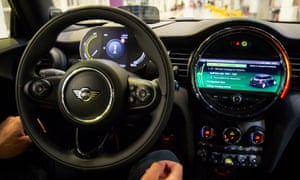New model will have list price of £24,400, with first deliveries expected in early 2020

The Mini Electric is unveiled at the BMW factory in Cowley, Oxfordshire.
Photograph: Jacob King/PA
Six decades after the original Mini first rolled off the production line in Oxford, its owner BMW has unveiled a new electric version it hopes will herald a new era – and help the German carmaker meet looming EU emissions targets.
BMW said it had 15,000 expressions of interest before order books open on Tuesday. The first deliveries to customers are expected in the first quarter of 2020, with a list price of £24,400, after the government’s plug-in car grant of £3,500 has been applied.
The investment in the new Mini will preserve the jobs of about 5,000 workers at the Oxford plant at an uncertain time for an industry awaiting Brexit clarity. The plant produced 234,501 Mini and Mini Clubman cars in 2018, an increase of 4.8% year on year.
While the original Mini was built by the British Motor Corporation in response to fuel rationing following the Suez crisis of 1956, the latest version will help BMW, which relaunched the Mini brand in 2000, reduce the average emissions of the cars it sells to meet EU carbon dioxide emissions limits.

Oliver Zipse, the BMW board member in charge of production, said: “We are entering an era in which electric cars will become a normal choice for our customers.
“The Mini Electric will kick off our new model offensive for fully electric vehicles.”
Sales of battery electric vehicles in the UK have surged in recent months, but from a very low base: only 11,975 were sold in the first half of the year, or 0.9% of total car sales, according to data from the Society for Motor Manufacturers and Traders (SMMT). Despite the successes of Tesla and Nissan’s Leaf electric vehicles, the industry is still waiting for a breakout electric hit.
The launch comes at a particularly important moment for BMW as it seeks a new chief executive after Harald Krüger last week said he would not seek an extension of his term in office.
Zipse, a previous Oxford plant director, is seen as a leading contender to replace Krüger, alongside the research and development chief, Klaus Fröhlich and the chief financial officer, Nicolas Peter.
The new chief executive will oversee a plan to launch 25 new electrified models by 2023, with at least 13 full-electric rather than hybrid. However, the company has also hedged its bets by producing its full-electric, hybrid, and internal combustion models using the same underlying blueprint and the same production lines – meaning it can quickly switch between fuel types in response to customer demand.